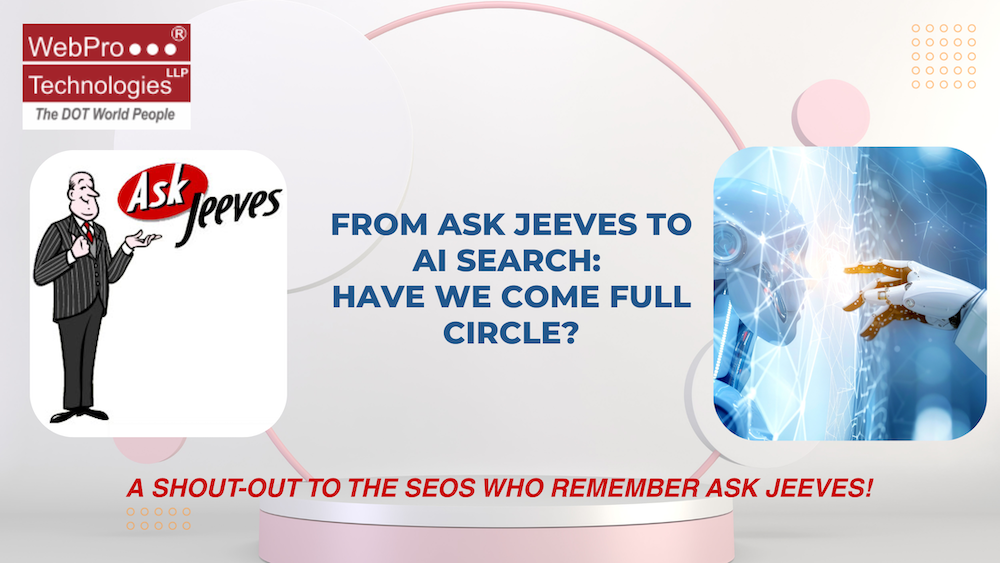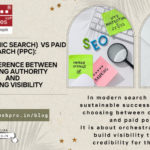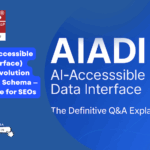A Shout-Out to the SEOs Who Remember Ask Jeeves
Before Google ruled the web and algorithms got smarter than most of us cared to admit, back in 1996 there was Ask Jeeves—a charming digital butler who invited us to “just ask” our questions. It was the dawn of a new digital age, and Ask Jeeves was among the first to imagine a search engine that spoke your language—not just through keywords, but through real, natural questions.
This post begins with a shout-out to all the SEOs who’ve been around long enough to have optimized content for Ask Jeeves. You know who you are—the ones who remember when natural language queries felt like a novelty, not the norm. For you, the current rise of AI-powered search isn’t just an evolution; it’s a déjà vu moment. We’ve come full circle, back to the idea that search should feel like a conversation. Only now, the technology has finally caught up with the vision. This post is for you—the veterans of the SERPs who’ve watched search transform from keywords to context, from ten blue links to tailored answers, and now, to AI-generated conversations.
Fast forward to 2025, and natural language is not just a novelty—it’s the default. With AI engines like ChatGPT, Perplexity, Google Gemini, and Claude shaping how we search, we’ve entered a new phase where interaction mimics human conversation. In a surprising twist, this futuristic era of artificial intelligence is echoing the same ambitions that Ask Jeeves once championed.
So, are we going back to the Ask Jeeves era? Not exactly—but the spirit of Ask Jeeves is very much alive, now supercharged by the power of LLMs (Large Language Models), machine learning, and generative AI.
Let’s take a deeper look at how the two eras compare—what’s similar, what’s fundamentally different, and what it all means for the future of search.
The Origin Story: Ask Jeeves and the Dream of Natural Language
When Ask Jeeves launched in 1996, most search engines relied on keyword matching. Users had to learn the logic of Boolean operators or try combinations of keywords until they got usable results. Ask Jeeves offered something different—an interface that allowed users to ask full questions, just like they would ask a librarian or a friend.
Example:
Instead of typing: "weather Paris July,"
You could ask: “What’s the weather like in Paris in July?”
The engine would then interpret the query and attempt to return relevant web pages. It also introduced early features like suggested answers, curated Q&A, and guided refinement of queries.
Ask Jeeves was friendly, approachable, and way ahead of its time. But it had limitations:
- It could only parse simple natural language patterns.
- Its backend search results often relied on other engines.
- It couldn't "understand" or generate information—it could only fetch it.
Eventually, Ask Jeeves dropped the butler in 2006 and rebranded as Ask.com. Google had become too powerful, and Jeeves, the friendly search valet, faded from the spotlight.
Fast Forward: The Age of AI Search
Today’s AI search engines are not just assistants—they’re co-thinkers. With models like GPT-4, Claude, and Gemini, search has evolved from lookup to conversation.
Instead of typing keywords or questions into a static search bar, users now:
- Ask complex, multi-part questions.
- Expect summarized answers, not just links.
- Refine their query in real time through follow-up prompts.
- Use search engines like chat partners, not just tools.
This is a radically new experience—and yet, it feels oddly familiar. It’s what Ask Jeeves wanted to be, but never quite could.
Similarities: Echoes of Ask Jeeves in the AI Era
Here’s how the AI search era mirrors the early ambitions of Ask Jeeves:
- Natural Language Interface
Ask Jeeves was one of the first search engines to let users ask full questions. Today, natural language is table stakes. Every AI assistant assumes you’ll speak to it conversationally.
The difference is scale. LLMs now parse grammar, intent, tone, and context across complex inputs. But the goal—speak like a human—remains the same.
- Single Answer Experience
Ask Jeeves aimed to give you a single, best-fit answer at the top of results. Today’s AI engines take that further by generating the answer directly, often without requiring a click.
This is part of a larger shift from the search engine results page (SERP) to the answer page—or no page at all. AI gives you what you need in a single interaction.
- Conversational Refinement
Jeeves sometimes offered follow-up suggestions or rephrasings. AI engines today do this in a much more sophisticated way:
- “Did you mean…?”
- “Would you like a more technical explanation?”
- “Shall I generate a chart?”
This dialogue-based refinement is the spiritual successor to what Ask Jeeves began.
Differences: What Makes the AI Era Fundamentally New
Despite these echoes, today’s AI search era is not just a revival—it’s a complete reinvention. Here’s what makes the two eras fundamentally different.
- From Fetching to Generating
Ask Jeeves could search and retrieve. AI engines can understand, reason, and create.
You’re not just being pointed to web pages—you’re getting answers that are synthesized from millions of sources. The AI can:
- Summarize
- Translate
- Write
- Analyze
- Visualize
Ask Jeeves would show you a recipe. ChatGPT can rewrite it to be vegan, scale it for a party of 12, and offer a shopping list.
- Contextual Memory and Interaction
Modern AI engines remember your previous questions within a session—or even across sessions if logged in. They learn your preferences, follow your logic, and adjust their tone and depth.
Ask Jeeves had zero memory. Every question was a reset.
- Multimodal Capabilities
Today’s AI systems can understand text, images, audio, and video. Ask Jeeves was limited to typed text. There was no visual search, image generation, or PDF summarization.
Now, you can:
- Upload an image and ask, “What’s this rash?”
- Paste a spreadsheet and ask for insights.
- Share a video and ask for scene summaries.
This changes the very nature of search.
- Personalized Intelligence
Ask Jeeves treated everyone the same. Today, AI engines can personalize responses based on who you are, your search history, your profession, or your task.
A doctor, student, and journalist asking the same question might receive differently framed answers from a well-tuned AI assistant.
Why Ask Jeeves Failed and AI Search Thrives
Ask Jeeves failed to dominate for several reasons:
- Technology was immature.
- User behavior wasn’t ready for conversational search.
- The internet was small and didn’t have enough structured information.
- Google's ranking algorithm was more efficient and scalable.
Today, AI search thrives because:
- Massive LLMs trained on trillions of tokens allow nuanced understanding.
- User expectations have shifted toward conversational interfaces (thanks to smartphones, voice assistants, and messaging culture).
- Web content is richer, more structured, and easier for AI to analyze.
- Computing power (especially GPUs and cloud infrastructure) enables real-time inference at scale.
In short, Ask Jeeves had the right idea—but the wrong era.
From Questions to Keywords to Prompts: The Evolution of How We Search
The journey from Ask Jeeves to AI search also maps the evolution of how we phrase our queries.
In the early days, we asked questions—natural, conversational ones—like “How do I bake a chocolate cake?”
Then, as search engines like Google rose to dominance, we adapted to keywords: “chocolate cake recipe easy.” Users were trained to speak the language of algorithms.
Now, with the rise of generative AI, we’ve entered the era of prompts—more structured, goal-oriented instructions like: “Write a step-by-step chocolate cake recipe in under 200 words, suitable for kids.” Prompts are not just queries—they are commands, conversations, and creative briefs rolled into one.
This shift reflects how search has evolved from retrieval to interaction, and from finding to generating. It’s not just about getting answers anymore—it’s about achieving outcomes.
Jeeves Reborn: The Spirit of Search in the AI Era
In a way, Jeeves was the proto-persona for everything we now call AI assistants. He was polite, helpful, and tried to understand your question. But he was a 2D butler in a 3D world that hadn’t been built yet.
Today’s AI engines are what Jeeves always wanted to be—intelligent, conversational, context-aware digital assistants. We’ve returned to that original vision, but now it’s no longer a novelty—it’s an expectation.
So yes, we are going back to the Ask Jeeves era.
But this time…
The butler actually knows the answer.
June 30, 2025







